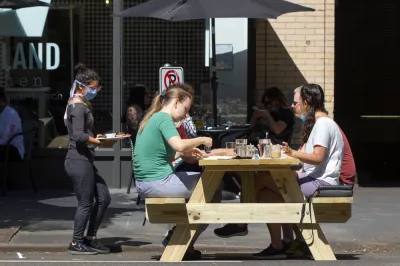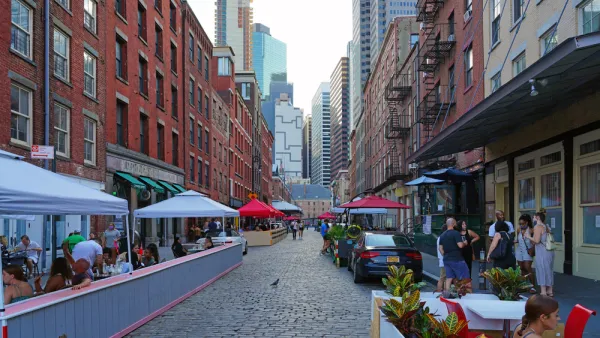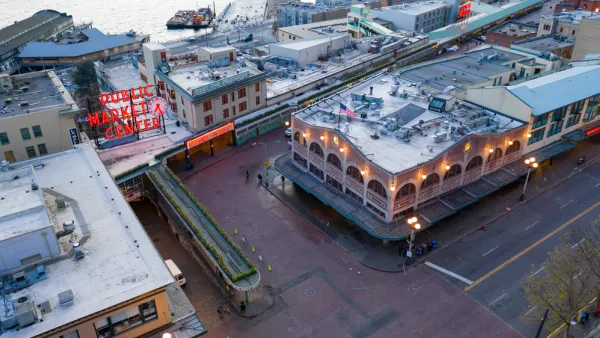It took a pandemic, but the worldwide effort to move restaurant and retail businesses outside, at the expense of parking, is proving far less controversial than it would have before the coronavirus swept the globe.

Something strange happened this summer, according to an article and radio broadcast for NPR by Camila Domonoske: the usual outrage when cities remove on-street parking in commercial areas hasn't materialized.
"Just ask Randy Rucker, the chef and owner of River Twice on East Passyunk Ave [in South Philly]. The restaurant placed tables in the street where as many as four cars used to squeeze in, in a neighborhood where every parking spot is prized."
The expected backlash never materialized. Rucker says it's been a positive experience.
Rucker is the owner of one of more than 400 businesses in Philadelphia to take advantage of the city's program to allow businesses to set up tables in parking lots—a program the city might extend throughout 2021. But cities all over the world are taking similar steps to lessen the footprint of cars in the public realm, with similarly less-than-controversial results.
So what explains the strange lack of controversy as businesses reclaim parking spots to operate during the pandemic? One explanation could be the lower traffic levels in general. "According to mapping company TomTom, Philadelphia's streets are about half as congested as they were pre-pandemic," writes Domonoske. Other sources confirm that vehicles miles traveled has plateaued below pre-pandemic levels in the United States.
"But even people who are driving and who still feel frustration over parking aren't protesting against the restaurant expansions," writes Domonoske. "One big reason why: They know the pandemic poses an existential threat to local restaurants."
For more on the planning and design specifics of "al fresco streets," see earlier coverage by Planetizen:
- Reopening Main Street (May 2020)
- Beyond Complete Streets: Could COVID-19 Help Transform Thoroughfares Into Places for People? (September 2020)
FULL STORY: Street Food: Cities Turn Parking Spaces Into Dining Spots And No One Seems To Mind

National Parks Layoffs Will Cause Communities to Lose Billions
Thousands of essential park workers were laid off this week, just before the busy spring break season.

Retro-silient?: America’s First “Eco-burb,” The Woodlands Turns 50
A master-planned community north of Houston offers lessons on green infrastructure and resilient design, but falls short of its founder’s lofty affordability and walkability goals.

Delivering for America Plan Will Downgrade Mail Service in at Least 49.5 Percent of Zip Codes
Republican and Democrat lawmakers criticize the plan for its disproportionate negative impact on rural communities.

Test News Post 1
This is a summary

Test News Headline 46
Test for the image on the front page.

Balancing Bombs and Butterflies: How the National Guard Protects a Rare Species
The National Guard at Fort Indiantown Gap uses GIS technology and land management strategies to balance military training with conservation efforts, ensuring the survival of the rare eastern regal fritillary butterfly.
Urban Design for Planners 1: Software Tools
This six-course series explores essential urban design concepts using open source software and equips planners with the tools they need to participate fully in the urban design process.
Planning for Universal Design
Learn the tools for implementing Universal Design in planning regulations.
EMC Planning Group, Inc.
Planetizen
Planetizen
Mpact (formerly Rail~Volution)
Great Falls Development Authority, Inc.
HUDs Office of Policy Development and Research
NYU Wagner Graduate School of Public Service




























